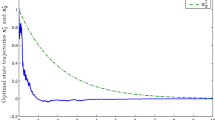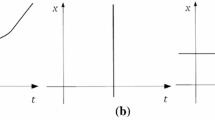Abstract
A switched linear quadratic (LQ) differential game over finite-horizon is investigated in this paper. The switching signal is regarded as a non-conventional player, afterwards the definition of Pareto efficiency is extended to dynamics switching situations to characterize the solutions of this multi-objective problem. Furthermore, the switched differential game is equivalently transformed into a family of parameterized single-objective optimal problems by introducing preference information and auxiliary variables. This transformation reduces the computing complexity such that the Pareto frontier of the switched LQ differential game can be constructed by dynamic programming. Finally, a numerical example is provided to illustrate the effectiveness.
Similar content being viewed by others
References
Li Y, Quevedo D E, Dey S, et al., A game-theoretic approach to fake-acknowledgment attack on cyber-physical systems, IEEE Trans. Signal Inform. Process. Netw., 2017, 3(1): 1–11.
Liu X, Dong M, Ota K, et al., Service pricing decision in cyber-physical systems: Insights from game theory, IEEE Trans. Serv. Comput., 2016, 9(2): 186–198.
Mylvaganam T and Astolfi A, Control of microgrids using a differential game theoretic framework, IEEE Conf. Decis. Control, Osaka, Japan, 2015.
Saad W, Han Z, Poor H V, et al., Game-theoretic methods for the smart grid: An overview of microgrid systems, demand-side management, and smart grid communications, IEEE Signal Process. Mag., 2012, 29(5): 86–105.
Srikantha P and Kundur D, A DER attack-mitigation differential game for smart grid security analysis, IEEE Trans. Smart Grid, 2016, 7(3): 1476–1485.
Mei S, Zhang D, Wang Y, et al., Robust optimization of static reserve planning with large-scale integration of wind power: A game theoretic approach, IEEE Trans. Sustainable Enery, 2014, 5(2): 535–545.
Li Y, Mu Y, Yuan S, et al., The game theoretical approach for multi-phase complex systems in chemical engineering, Journal of Systems Science & Complexity, 2017, 30(1): 4–19.
Başar T and Olsder G J, Dynamic Noncooperative Game Theory, SIAM, Philadelphia, 1998.
Engwerda J, LQ Dynamic Optimization and Differential Games, John Wiley & Sons, Chichester, 2005.
Ho Y C, Bryson A, and Baron S, Differential games and optimal pursuit-evasion strategies, IEEE Trans. Autom. Control, 1965, 10(4): 385–389.
Garcia E, Casbeer D W, and Pachter M, Active target defence differential game: Fast defender case, IET Contr. Theory Appl., 2017, 11(17): 2985–2993.
Mylvaganam T, Sassano M, and Astolfi A, A differential game approach to multi-agent collision avoidance, IEEE Trans. Autom. Control, 2017, 62(8): 4229–4235.
Li S and Hou C, On the collision detection problem of two moving objects described by algebraic sets, Journal of Systems Science & Complexity, 2007, 20(1): 108–118.
Semsar-Kazerooni E and Khorasani K, Multi-agent team cooperation: A game theory approach, Automatica, 2009, 45(10): 2205–2213.
Gao H, Petrosyan L, Qiao H, et al., Cooperation in two-stage games on undirected networks, Journal of Systems Science & Complexity, 2017, 30(3): 680–693.
Zhang Q, H2/H8 control problems of backward stochastic systems, Journal of Systems Science & Complexity, 2014, 27(5): 899–910.
Sethi S P and Zhang Q, Asymptotic optimal controls in stochastic manufacturing systems with machine failures dependent on production rates, Stochastics and Stochastic Reports, 1994, 48(1–2): 97–121.
Eklund J M, Sprinkle J, and Sastry S S, Switched and symmetric pursuit/evasion games using online model predictive control with application to autonomous aircraft, IEEE Trans. Control Syst. Technol., 2012, 20(3): 604–620.
Xu X and Antsaklis P J, Optimal control of switched systems based on parameterization of the switching instants, IEEE Trans. Autom. Control, 2004, 49(1): 2–16.
Kamgarpour M and Tomlin C, On optimal control of non-autonomous switched systems with a fixed mode sequence, Automatica, 2012, 48(6): 1177–1181.
Liberzon D, Switching in Systems and Control, Birkhuser, Boston, 2003.
Zhao J and Hill D J, On stability, L2-gain and H8 control for switched systems, Automatica, 2008, 44(5): 1220–1232.
Long L, Wang Z, and Zhao J, Switched adaptive control of switched nonlinearly parameterized systems with unstable subsystems, Automatica, 2015, 54(4): 217–228.
Engwerda J, Necessary and sufficient conditions for pareto optimal solutions of cooperative differential games, SIAM J. Control Optim., 2010, 48(6): 3859–3881.
Leitmann G, Cooperative and Non-Cooperative Many Players Differential Games, Springer, Vienna, 1974.
Bertsekas D P, Dynamic Programming and Optimal Control, Athena Scientific Belmont, Belmont, 1995.
Salukvadze M, Vector-Valued Optimization Problems in Control Theory, Academic Press, New York, 1979.
Author information
Authors and Affiliations
Corresponding author
Additional information
This work was supported by the National Natural Science Foundation of China under Grant No. 61773098 and the 111 Project under Grant No. B16009.
This paper was recommended for publication by Guest Editor LIU Tengfei.
Rights and permissions
About this article
Cite this article
Huang, Y., Zhao, J. Pareto Efficiency of Finite Horizon Switched Linear Quadratic Differential Games. J Syst Sci Complex 31, 173–187 (2018). https://doi.org/10.1007/s11424-018-7439-7
Received:
Revised:
Published:
Issue Date:
DOI: https://doi.org/10.1007/s11424-018-7439-7




